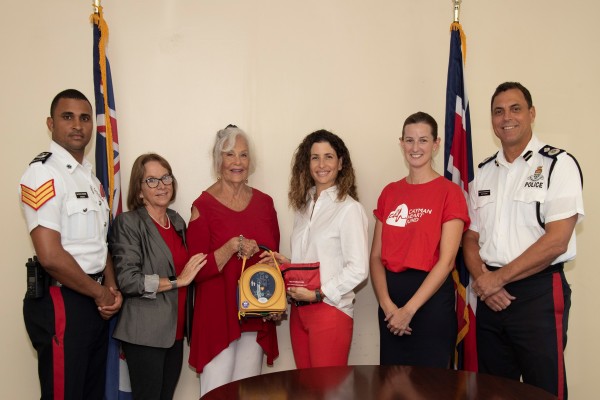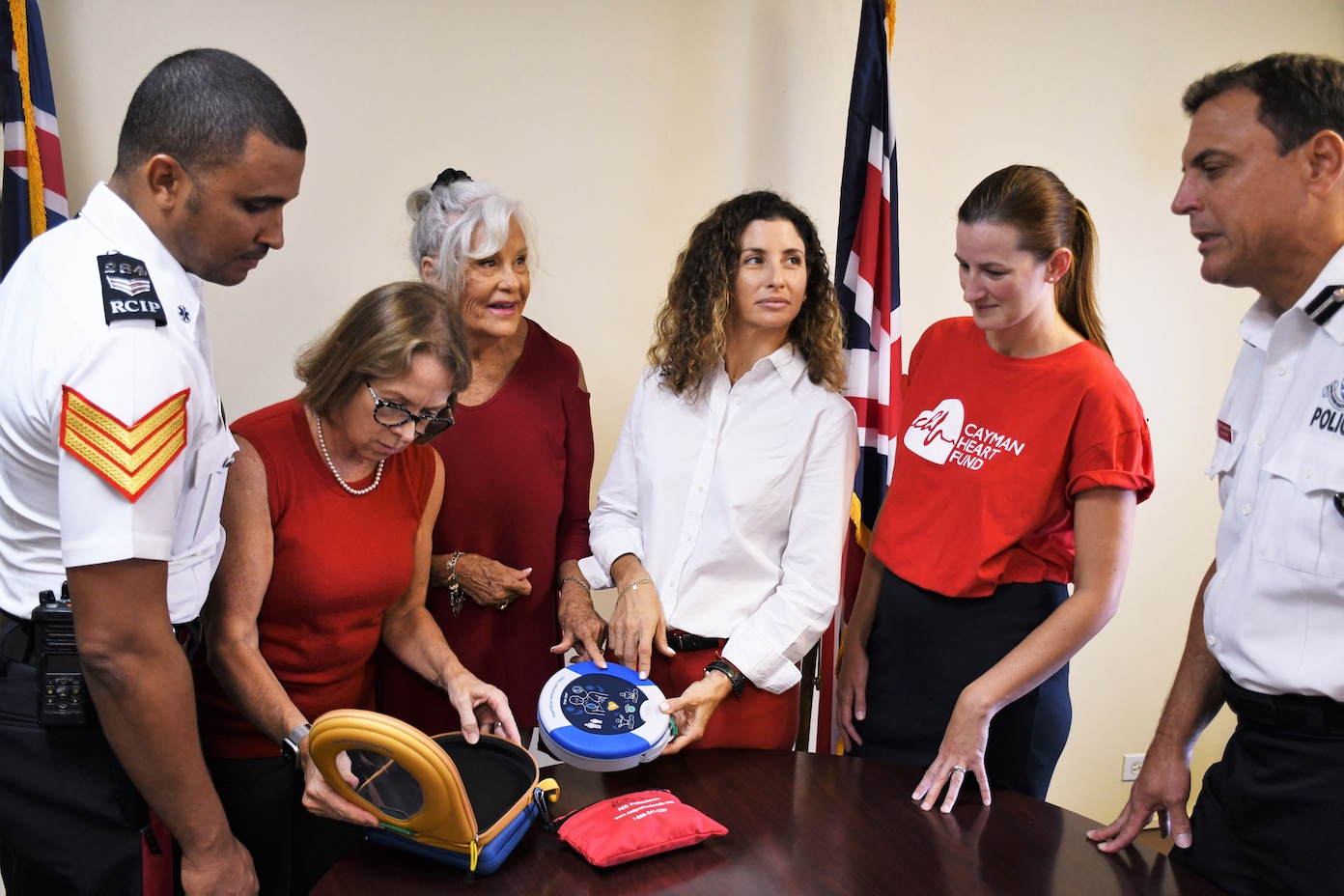AED Equipment for RCIPS
Cayman Heart Fund donates life-saving AED equipment to the RCIPS
from RCIPS

Today, 4 December, the Royal Cayman Islands Police Service (RCIPS) is delighted to announce that it has received a donation of 22 AED (Automated External Defibrillators) battery packs and 20 CPR (Cardiopulmonary Resuscitation) Kits from the Cayman Heart Fund. This generous donation means that these life-saving devices remain ready to be used by front-line officers should an emergency arise.


Between 2012 and 2016 the Cayman Heart Fund donated 20 Automated External Defibrillators (AEDs) to the RCIPS. These are in police stations across all three islands, the Detention Centre, the RCIPS helicopter, Coast Guard vessels, and certain police vehicles.
Helping to coordinate the initial donation, deployment, and continued maintenance of the AEDs, are Acting Sergeant Brandaughn Phillips and Special Constable Inspector Jayse Wilson. The officers recognized the importance of the devices and helped the RCIPS reach out to the Cayman Heart Fund, who were more than willing to assist.
“Our aim was to better equip first responders with the tools to render critical first aid to a victim experiencing a cardiac condition. This is part of our ongoing commitment to supporting the Cayman Islands community’s access to lifesaving equipment,” said Suzy Soto, Founder and Chair Emeritus of the Cayman Heart Fund.
“When a person suffers a cardiac arrest, unless they are treated within minutes, they usually die because blood is no longer being pumped to the brain and other parts of the body,” says Dr. Bella Beraha, Chairperson of the Cayman Heart Fund. “Quickly shocking the heart with an AED can save a person’s life after their heart suddenly stops beating.”
An AED, or automated external defibrillator, is a portable easy-to-use electronic medical device that any by-stander without prior medical knowledge can use when someone has a sudden cardiac arrest. AEDs themselves do not expire, however, their battery packs need replacing every three to four years to ensure they remain operational. The batteries of the RCIPS AEDs became due for replacement just as the Cayman Islands started to come out of the COVID-19 lock down in July.
“We are exceptionally grateful to the Cayman Heart Fund for their support over the years, from their initial donation of the AEDs, to this donation of replacement battery packs and CPR kits,” says Kurt Walton, Deputy Commissioner of Police. “Having these AEDs available and easily accessible means that our officers have one more tool at their disposal in saving lives, and this donation allows us to ensure that they remain ready to be utilized.”
“Due to the unique conditions created by the Coronavirus pandemic we were aware that the demand for police services was greatly altered in 2020,” says Katie O’Neill, Board Member, Cayman Heart Fund. “One of the Cayman Heart Fund’s objectives is to make this a safer country and we are pleased to donate AED equipment to the RCIPS in order to ensure these life saving devices remain ready to be used by front-line officers should an emergency situation arise.”
To increase the likelihood of surviving a cardiac event, a first responder must have the ability to use an AED right away, generally within the first three minutes. Police officers are frequently the first responders to such incidents, often before an ambulance arrives.
“The AED’s available from the Cayman Heart Fund are compact and lightweight and designed for simplicity, with a single on/off button and easy to understand visual and voice prompts that guide the rescuer through the entire resuscitation process, including CPR—a key link in the chain of survival,” says Allison Olarou, CHF Coordinator. “Our aim is to have as many AEDs as possible in the community.”
AEDs can be purchased from the Cayman Heart Fund for homes or workplaces. For every nine AEDs that the CHF sells, they donate the tenth one to somewhere in need.
“While these devices are common in many businesses, schools and public venues, many gatherings and events in the Cayman Islands take place without one nearby,” adds Allison. “To help make this lifesaving technology more readily available, anyone can request an AED on a temporary basis, from the CHF free of charge through our AED Loan Program.”
As with all charitable organisations the Cayman Heart Fund’s fundraising has been greatly impacted by the Coronavirus Pandemic. Team Nolan, the paediatric program of the Cayman Heart Fund, was forced to postpone its largest awareness and fundraising event, KIDSFEST, originally planned for June 27, 2020.
“Cayman Heart Fund is a non-profit organization incorporated under the Companies Law (2007 Revision) in 2007, with Registration License # 220594,” says Allison. “Our aim is to alert, reduce and help prevent Cardiovascular Disease (CVD) – Cayman’s #1 cause of death in the Cayman Islands. We achieve this through education, training and by providing medical equipment and services to the public.”
If you require further information, please contact the Cayman Heart Fund at: (345) 916-6324 or email: [email protected]





